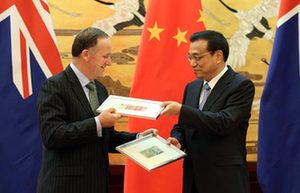BEIJING -- Since Chinese President Xi Jinping called for integration of regions around Beijing in February, the market response has been quick: property prices in neighboring cities have kept rising, as have related stocks.
But concrete moves on the official level are still in slow motion.
In a brief statement on its website, China's National Development and Reform Commission, the top economic planner, announced on Wednesday that it is drawing up a plan for the coordinated development of a Beijing-centered "economic circle," but did not say when it will come out.
The idea of integrated development among Beijing and Tianjin municipalities and Hebei Province is not new. The central government first proposed plans to coordinate development in the regions in 2004.
Since then, however, there has been little solid progress except for the building of a few transport networks that connect the regions, spawning the creation of "sleeping city" commuter towns around Beijing.
Beneath the unintended outcome is the uneven growth and resource distribution among the regions, with Beijing enjoying unmatchable blessings both in the political and economic sphere.
Exactly how the renewed push will deliver will hinge on authorities' resolve and wisdom to balance the game of interests between the regions.
Beggar thy neighbor
One of the apparent intentions of the integration design is to move some industries out of exploding Beijing, where pollution, traffic jams and population pressure are getting too serious to ignore.
But at a time when the public is growing more sensitive to the environment, Beijing cannot simply seek to cure its own ills by beggaring its neighbors.
Langfang, a nearby city in Hebei Province, has made it clear that those low-end polluting industries deserting Beijing will not be welcomed in Langfang either.
Zhang Gui, deputy head of the Beijing-Tianjin-Hebei research center under the Hebei University of Technology, pointed out that instead of purely ridding itself of unwanted industries, Beijing should also consider passing some of its non-essential interests and resources to surrounding cities.
To facilitate an orderly transfer, the first step is to clearly position the roles of different cities, and allow the market to assess the costs and make the decision, according to analysts.
"The role of the government is to step up policy design, improve the fiscal system and adjust the evaluation criterion on officials," said Zhao Hong, vice president of the Beijing Academy of Social Sciences.
|
 |
 |
